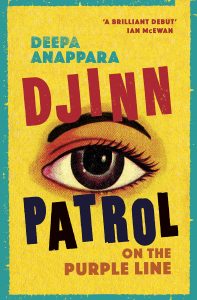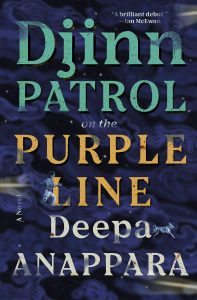 Published by Chatto & Windus UK/Random House US
Published by Chatto & Windus UK/Random House US
30 January/4 February 2020
352/368pp, hardback, £14.99/$27
Reviewed by Rachel Hore
‘I look at our house with upside-down eyes and count five holes in our tin roof. There might be more, but I can’t see them because the black smog outside has wiped the stars off the sky.’ Jai is the nine-year-old protagonist of Deepa Anappara’s literary debut, and it would be hard to imagine a fresher, more poignant child’s eye view than his of the family’s one-room shack in an Indian megacity.
When slum children start going missing and the police take scant interest, Jai, who watches too many reality cop shows, decides to conduct his own investigation. In this he’s assisted by two schoolmates: Pari, the smart girl who always gets top marks, and Faiz, a boy from the Muslim minority. Risking kidnappers and soul-snatching djinns they visit the most  dangerous parts of their locality, often at night, interview stall-holders at the local bazaar, search the nearby rubbish dump, and even travel the Purple Line on the Metro, using rupees ‘borrowed’ from Jai’s mother’s emergency pot. There’s a jauntiness to their early efforts, but as time passes and more children vanish, a sense of urgency takes over. There is worse to come and closer to home. A sense of horror and violence haunts this tale, faintly at first, but later with growing power.
dangerous parts of their locality, often at night, interview stall-holders at the local bazaar, search the nearby rubbish dump, and even travel the Purple Line on the Metro, using rupees ‘borrowed’ from Jai’s mother’s emergency pot. There’s a jauntiness to their early efforts, but as time passes and more children vanish, a sense of urgency takes over. There is worse to come and closer to home. A sense of horror and violence haunts this tale, faintly at first, but later with growing power.
As a one-time journalist in Delhi, Deepa Anappara knows of what she writes, and her prose, richly punctuated by local idiom, is exceptionally vivid. She evokes the variety, individuality and vitality of the characters in Jai’s community with skill and humour, whilst underlining the appalling conditions in which they live. There’s little sanitation and they must join long queues for toilets or simply use the rubbish dump or the street. Work is precarious. Jai’s mother cleans for a ‘madam’ in one of the luxurious ‘hi-fi’ blocks that loom over the slum and relies on left-over scraps from her employer’s table to feed Jai, his father, and elder sister Runu.
Jai’s perspective is bold, brave, funny, touching and multi-faceted. He is at once irrepressible, honest, discerning, true, but also tactless and disobedient. He squabbles with his sister and joshes with his friends. In all, his voice transforms some pretty grim material into something life-affirming.
This is the kind of fiction that beguiles whilst packing a huge political punch. Even aged nine, Jai is aware of the casual injustices of his world, how the police value the lives of hi-fi dwellers more than slumdogs like himself. The slum dwellers dread bulldozers being brought in to flatten their homes if they complain too much. It’s a place where poor women hoard cheap trinkets to bribe the authorities or to pay fake soothsayers, where children who miss school are struck off the register rather than investigated, where religious minorities are easy scapegoats, where the cycle of poverty means bright kids will end up selling roses on the street in choking smog – or stolen away without trace.
